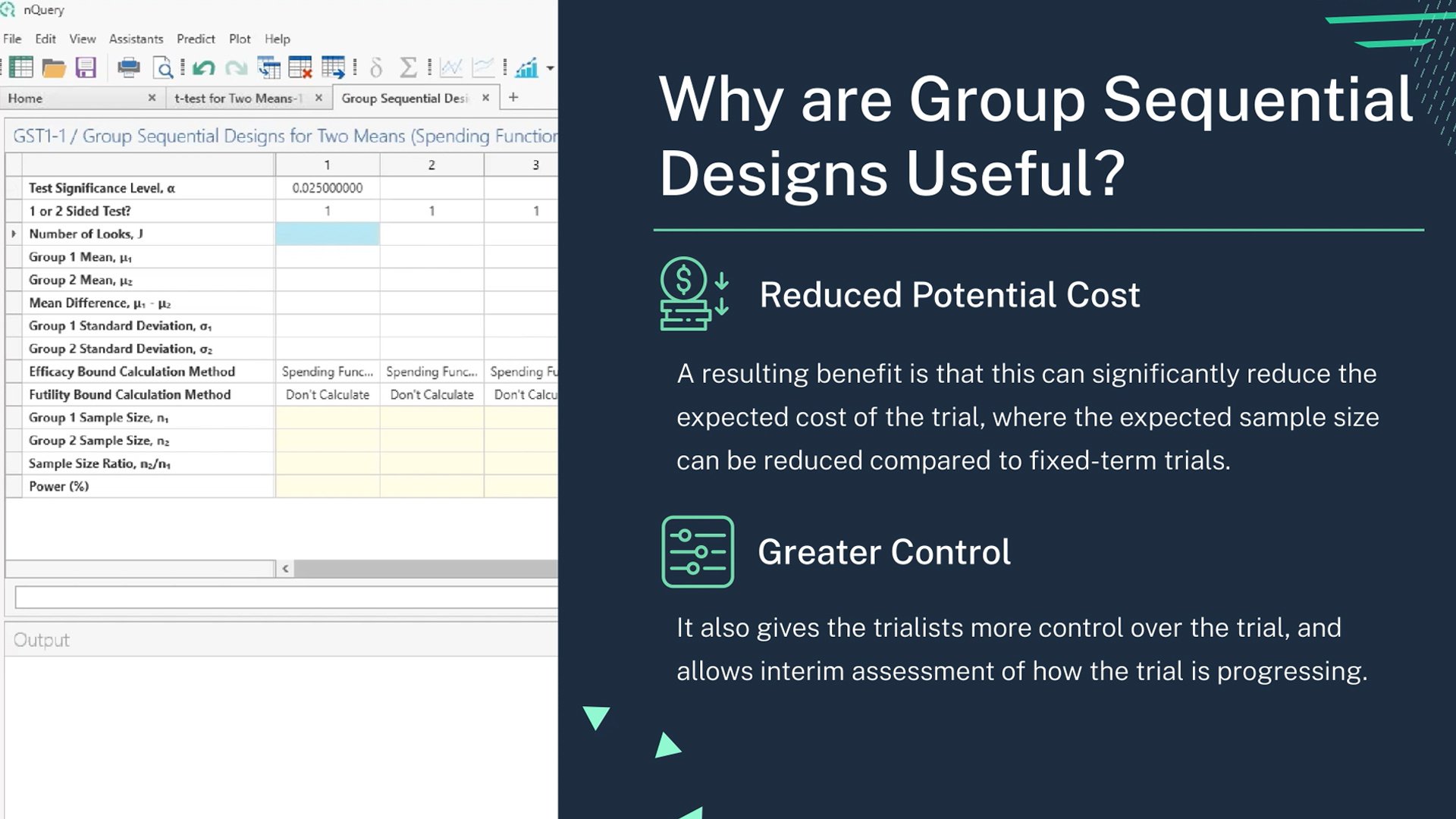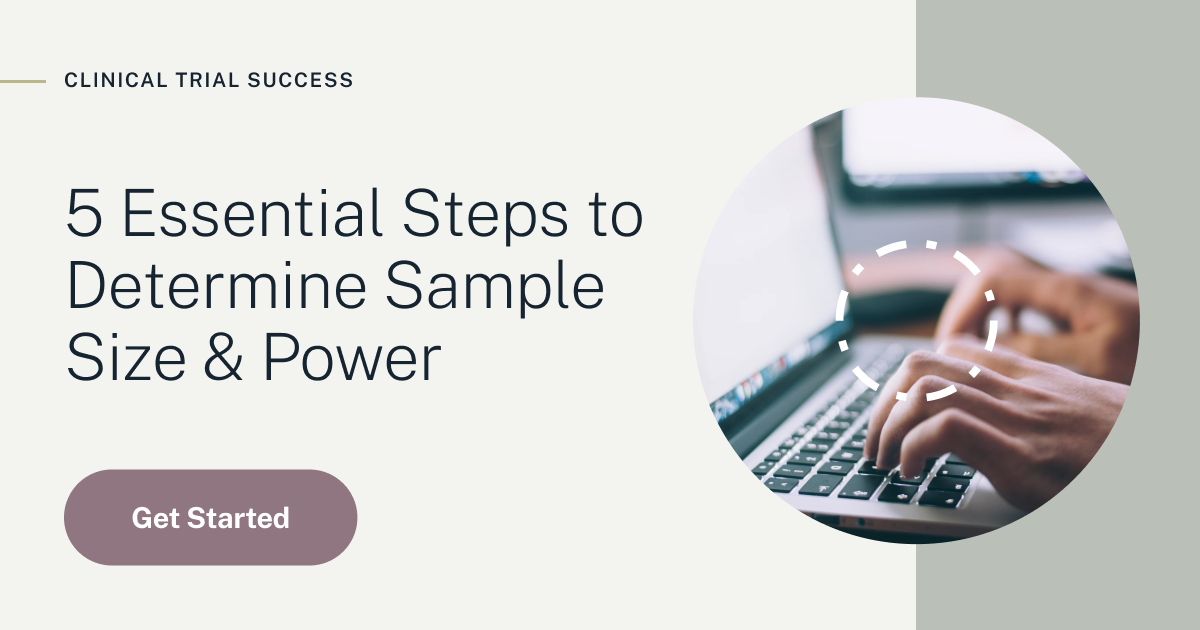Sample Sizes for Vaccine Trials
- Test for Relative Incidence of Adverse Events using Self-Controlled Case Series Method with Age Effects.nqt
- Non-Inferiority Supersuperiority Test for Vaccine Efficacy with Extremely Low Incidence from Disease Rates.nqt
- Inequality Tests for One Proportion.nqt
- Deferred Vaccine Tests for Durability and Harm in a Crossover Trial.nqt
Free Webinar
Sample Sizes for Vaccine Trials
Trial Designs for Assessing Vaccine Efficacy, Safety & Durability
In this webinar, Calvin O'Brien, Research Statistician at nQuery, has explored vaccine trial designs, specifically how to assess three key aspects of vaccine performance:
- Efficacy
- Safety
- Durability
Learning objective of this webinar:
In this webinar we have covered the statistical foundation of vaccine development and rollout using real world examples.
Most vaccine studies focus primarily on efficacy (how well a vaccine protects against disease) and safety (whether the vaccine causes adverse events). However, the full picture requires looking at various aspects together in order to assess the suitability of rollout to a large population, along with monitoring post rollout.
Key Statistical Approaches Covered in This Webinar
Ways to Evaluate Vaccine Efficacy
- Risk ratio calculations and their implementation in sample size determination
- Event-driven statistical approaches as used in COVID-19 vaccine trials
- Poisson regression, binomial, and Cox proportional hazards models with practical examples
Approaches to Monitor and Understand Vaccine Safety
- Mathematical foundations of relative incidence measurement
- Sample size formulations for detecting rare adverse events
- Accounting for age effects in safety signal detection
Assessing Vaccine Durability
- Statistical approaches for measuring protection longevity
- Power calculations for detecting waning immunity
- Methodologies for ethical placebo-controlled studies
Frequently Asked Questions About Vaccine Trial Statistics
What makes vaccine trial statistics different from other clinical trials?
Vaccine trials present unique statistical challenges because they typically require larger sample sizes than therapeutic trials, focus heavily on safety in healthy populations, and need to detect relatively rare events. The statistical methods must account for changing background disease rates, potential waning immunity, and the ethical considerations of placebo control groups when effective vaccines become available.
Why are sample sizes for vaccine trials typically so large?
Vaccine trials require large sample sizes for several reasons:
- To detect rare adverse events that might only occur in 1 in 10,000 or fewer vaccinations
- To measure efficacy when background disease rates may be low
- To account for the fact that most participants in the vaccine group will never be "challenged" by exposure to the pathogen
How do statistical methods differ for assessing vaccine efficacy versus safety?
Efficacy assessment typically uses comparative statistics between vaccine and control groups, measuring relative risk reduction through methods like Poisson regression or Cox proportional hazards models. Safety assessment often employs self-controlled case series methods that compare incidence rates of adverse events within individuals before and after vaccination, requiring different statistical approaches and sample size calculations.
What statistical approaches help measure how long vaccine protection lasts?
Durability assessment relies on specialized statistical designs such as deferred vaccination models and crossover designs that allow ethical follow-up after initial efficacy is established. These approaches use time-to-event analyses, waning efficacy models, and methods to distinguish between true durability issues versus emerging variants that might evade immunity.
How did COVID-19 vaccine trials adapt statistical methodologies?
COVID-19 vaccine trials implemented several statistical innovations, including:
- Event-driven designs that allowed for faster completion during high transmission periods
- Sequential testing frameworks that balanced speed and safety
- Bayesian statistical approaches for interim analyses
Key Questions Addressed in This Webinar
How do vaccine trials address efficacy, safety & durability together?
Traditional vaccine trials emphasize efficacy and safety, but to fully understand a vaccine's value, durability—the persistence of protection—must also be assessed. This webinar covers comprehensive approaches that combine short-term outcomes with long-term monitoring, offering a more complete picture of vaccine performance over time and across diverse populations.
What are the fundamental tools for measuring vaccine efficacy?
Evaluating vaccine efficacy requires appropriate endpoints and statistical tests. Core techniques include proportion tests, risk ratio assessments, and case-control comparisons, all of which help determine how well the vaccine reduces disease incidence. The session explores how efficacy estimates are derived under varying assumptions and how to adjust for confounding variables.
How can we monitor vaccine safety responsibly and effectively?
Vaccine safety is not a static outcome—it evolves with widespread use. Methods such as the Self-Controlled Case Series (SCCS) and relative incidence modeling are vital for detecting rare or delayed adverse events. This session explains how to apply these methods during Phase IV and in observational post-licensure data.
How do we measure and address waning immunity over time?
Understanding durability requires longitudinal monitoring and trial designs tailored to detect waning efficacy. The webinar introduces deferred vaccination designs and breakthrough infection tracking as strategies to measure declining protection, along with subgroup analyses to identify populations at higher risk for waning protection.
What's next in vaccine trial methodology?
With the rise of new technologies and variants, vaccine trial design must evolve. This webinar touches on adaptive frameworks, improved post-market surveillance methods, and advanced statistical modeling that are reshaping how vaccine performance is assessed.
About nQuery
nQuery helps make your clinical trials faster, less costly and more successful. It is an end-to-end platform covering Frequentist, Bayesian, and Adaptive designs with 1000+ sample size procedures.
nQuery Solutions
- Sample Size & Power Calculations: Calculate for a Variety of frequentist and Bayesian Design
- Adaptive Design: Design and Analyze a Wide Range of Adaptive Designs
- Milestone Prediction: Predict Interim Analysis Timing or Study Length
- Randomization Lists: Generate and Save Lists for your Trial Design
Start your unlimited 14-day trial.
Who is this for?
This will be highly beneficial if you're a biostatistician, scientist, or clinical trial professional that is involved in sample size calculation and the optimization of clinical trials in:
- Pharma and Biotech
- CROs
- Med Device
- Research Institutes
- Regulatory Bodies














